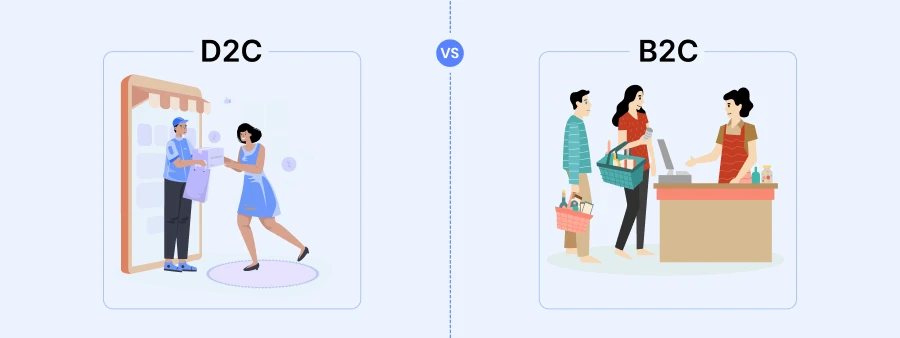24 Facebook Marketplace Scams You Must Know to Stay Alert!
- May 21, 2024
- 21 mins read
- Listen

Facebook Marketplace is an amazing place to find great deals on everything from furniture to electronics. But with amazing bargains come potential pitfalls. Unfortunately, scammers lurk online. They’re waiting to exploit unsuspecting buyers and sellers. Do you know what are the common scams in Facebook Marketplace? But, why should you know that? It’s simple! If you already acknowledge these scams, they will help you stay safe from being scammed.
The data shows that more than one billion shoppers visit it every month and 51.2% of social media consumers use it to make their most recent purchase on Facebook Marketplace.
In this article, we will look at the most common Facebook Marketplace scams, ways to prevent and more.
What is Facebook Marketplace Scam?
A Facebook Marketplace scam refers to any deceptive or fraudulent activity conducted on Facebook’s online marketplace platform, with the intent to deceive users and exploit them financially or otherwise.
A recent survey revealed that one in six participants (i.e. 17%) were scammed on Facebook Marketplace. Of course, much of what is offered on this platform is legitimate. However, with any other platform, it also attracts many scammers.
Facebook Marketplace Payment Scams

The most common scams often occur on Facebook. Scammers are looking for ways to steal your money or personal information. When it comes to payments. There are several tricks they use to try and take advantage of you.
Now I’m going to share the top payment scams on Facebook so that you can stay away from them.
1. Gift Card Payment Scams
Don’t fall into this trap. Fraudsters trick buyers into purchasing gift cards as payment. Afterward, they just disappear into thin air without delivering the goods.
2. Venmo Scams
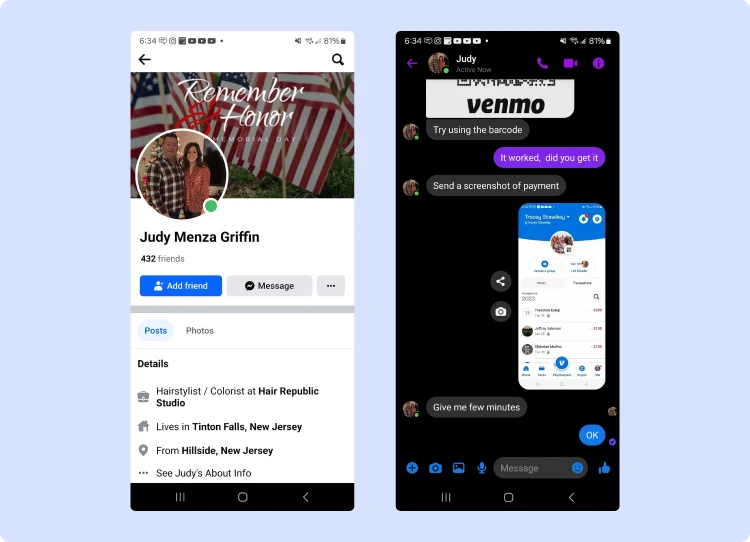
A scammer may steal your friends or family members’ Venmo accounts and they will text you and ask you to borrow money. Once you borrow them any money means you are being scammed.
Also, it can happen with goods or any service. They may exploit Venmo transactions on Facebook Marketplace. It often results in non-delivery or counterfeit items. Below are some common Venmo scams.
- Shipping scams
- Phishing scams
- Overpayment scams
- Rental property deposit scams
3. Facebook Marketplace Cash App Scams
It is quite similar to Venmo scams. There are some common ways scammers may fall you into the trap and you are being scammed for many reasons. For example, Jane listed her old smartphone for $200 on Facebook Marketplace. A buyer, Alex, contacted her and insisted on paying via Cash App.
Once Jane provided her Cash App details, Alex sent a screenshot showing the payment was made. Based on the payment screenshot, Jane shipped the phone. However, after checking her Cash App account, Jane realized she never received the payment. Alex had used a fake screenshot to deceive her.
4. Facebook Marketplace Zelle Scams
In most cases, the buyer claims they have sent a payment. But, the seller never receives the money. They use fake email notifications to make it look like the payment is pending or completed. For example, David was selling his bicycle for $150. A buyer named Jordan offered to pay via Zelle.
Soon after, David received an email that appeared to be from Zelle, stating that the payment was pending and that he needed to provide a tracking number to complete the transaction. David shipped the bicycle and sent the tracking number, only to discover that the email was fake and that Jordan had never sent any money.
5. Overpayment Scams
It is another common scam on Facebook Marketplace. In most cases, the scammer sends a check or claims to have transferred more money than the agreed price. After they ask the seller to refund the excess amount.
The initial payment turns out to be fake or reversed. To understand it well. For example, you’re Lisa, and you’re trying to sell a used couch for $300. On the other hand, a buyer named Collin sent a check for $1,000. He is claiming that he made a mistake.
And, asked you to wire back the $700 difference. You deposited the check and sent John $700. A few days later, your bank informed you that the check was fraudulent and withdrew the entire $1,000 from her account, leaving you out $700. It means you’re being scammed. So, you need to be informed about this kinda scam.
6. Facebook Marketplace Wire Transfer Scams
In this kind of scam, fraudsters will convince you to accept payment through wire services like Western Union or MoneyGram. But it can happen and you fall into scammed? Here is an example for you.
Just think of a minute you listed your gaming console for $250. A buyer named Lea claimed to be from another state. She offered to pay through a wire transfer and have the console shipped. After you received the transfer confirmation, you shipped the console. Later, you found out the transfer confirmation was fake, and Lea was untraceable.
7. Counterfeit Currency
This scam includes buyers using fake money to pay for items on Facebook Marketplace. In this way, the scammer agrees to meet the seller in person. Afterward, they want to pay for the item with counterfeit cash. When the time the seller realizes the money is fake. The scammer has already taken the item and disappeared. This type of counterfeit bill can be hard to detect immediately. In particular, during quick transactions.
Most Common Product and Inventory Scams

Deceptive sellers use clever tactics to trick you into paying for something that’s far from what it seems – broken, non-existent, or completely misrepresented. While it might be the perfect find, there’s a chance it could be a scammer’s trap.
Let’s take a look at some of the most common Facebook Marketplace scams related to products and inventory:
8. Bait-and-Switch Scams
This type of scam includes luring buyers with attractive listings. They switch the item for something of lesser value or different from what was advertised. How does the scammer set this type of trap in Facebook Marketplace? A scammer posts a listing for a high-demand item at a great price.
When a buyer expresses interest, the scammer claims that the original item is no longer available. Also, they offer a substitute that is often of lower quality or higher price. In this case, the buyer, feeling pressured or still hopeful, might agree to the switch and end up with a product that does not match their expectations.
9. Facebook Marketplace Shipping Scams
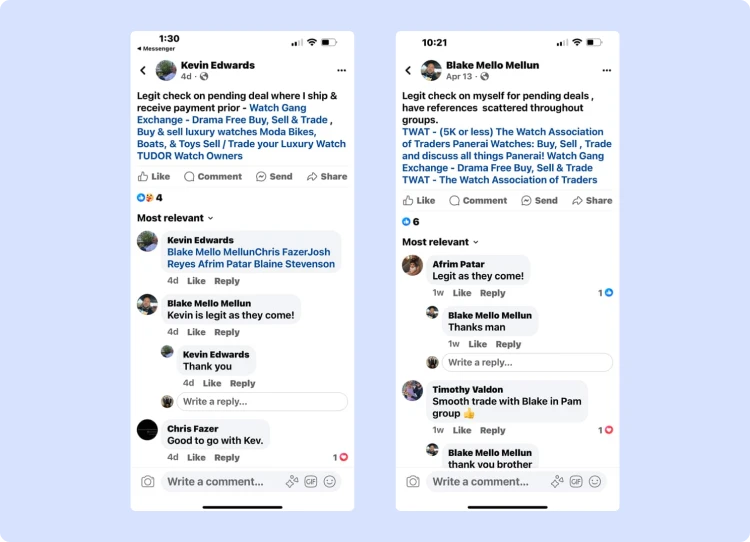
It is one of the most common scams that often happen in the marketplace. And a lot of people are encountering this type of scam. Shipping scams are all about convincing the seller to ship the item before the payment is confirmed. Sometimes they use a fake courier service. But, how do they do that?
A scammer agrees to buy an item and suggests using a courier service they claim is reliable. The next step is to send a fake payment confirmation or claim the money is pending. They say the payment will be released once the item is shipped. The seller, believing the transaction is legitimate, ships the item. Once the scammer receives the item they just disappear without paying.
10. Facebook Marketplace Car Scams
It includes fraudulent listings for vehicles that either do not exist or have significant undisclosed issues. This way a scammer lists a car at an attractive price. When a buyer contacts them, they often request a deposit to “hold” the car or cover shipping costs.
When the buyer sends the money, the car never arrives. Just because it doesn’t exist. Sometimes, it arrives with undisclosed problems. In other cases, the scammer might sell a stolen vehicle with fake documents.
11. Fake or Stolen Items
This type of scam includes selling items that are either counterfeit or stolen. Do you know how a scammer set a trap for this? They list high-demand items like electronics, designer goods, or tickets at attractive prices.
Once any customer purchases these items. They turn out to be fake, or worse, they are stolen goods. If your purchased items are stolen, you could face legal issues when authorities track the stolen property.
12. Rental Scams
This type of scam includes fake listings for properties available for rent. For example, scammers post appealing rental listings at below-market prices to attract renters. When someone expresses interest.
They ask for a security deposit or first month’s rent to secure the property. To make it credible they might send fake lease agreements and keys that don’t work. Once the payment is made, the just will disappear. In most cases, the victim finds out the property either doesn’t exist or isn’t available for rent.
13. Faulty or Damaged Items Scams
It is another recognized method of scamming in Facebook Marketplace. Usually, scammers sell defective or damaged items while claiming they are in good condition. But how do they victimize?
They create a sell post item and describe it as being in excellent or working condition. When a buyer purchases it and takes it home. They discover the item is broken, damaged, or non-functional. When the victim’s attempts to contact the seller are often futile. They can’t because the scammer either provides false contact information or blocks the buyer.
Social Engineering Scams

Have you ever received a call from your “bank” about suspicious activity, only to find out later it was a scam? Or maybe you’ve clicked on a link in an email promising a “dream job” that turned out to be a phishing attempt.
These are just a few examples of social engineering scams. Keep reading to learn about common Facebook Marketplace scams on social engineering:
14. Phishing Scams
In this case, scammers use deceptive emails or messages to trick users into providing sensitive information such as login credentials or financial details.
15. Mouthwatering Giveaway Scams
Fraudsters lure users with fake giveaways or contests on Facebook Marketplace, aiming to collect personal information or defraud participants.
16. Verification Code Scams
You may face this type of Facebook Marketplace scam. Scammers convince users to provide verification codes, often claiming it’s for security purposes, then use the codes to hijack accounts or perform fraudulent activities.
17. QR Code Scams
Fraudulent sellers may provide QR codes that lead to malicious websites or scams, exploiting users’ trust in QR technology for nefarious purposes.
18. Immediate Interest Scams
In this way, scammers express exaggerated interest in purchasing items on Facebook Marketplace. They often rush buyers into hasty transactions or use high-pressure tactics to manipulate them into making impulsive decisions.
These are the most common Facebook Marketplace Scams. Apart from these also we can see some other scams. Such as:
19. Asking for Items Before Payment is Received
Scammers request items upfront without intending to pay. After that, they leave sellers at a loss and without compensation for their goods
20. Broken Electronics
It is another common scam that often happens. In most cases, dishonest sellers list electronic devices as functional on Facebook Marketplace. Only for buyers to discover upon receipt that the items are damaged or non-functional.
21. Fake Peer-to-peer Payment App Requests
Fraudsters request payments through peer-to-peer payment apps outside of Facebook Marketplace. They often use fake accounts or deceptive tactics to trick users out of their money without delivering the promised goods.
22. Communicating Outside of the Marketplace App
Some scammers may attempt to move communications off the official platform. They try to make it harder for users to report suspicious activity increasing the risk of fraudulent transactions.
23. Facebook Account Hacking
A cunning tactic hackers are increasingly using involves hijacking Facebook accounts. Once they’re in, they impersonate the rightful owner and send direct messages to friends and family. They ask for the money on behalf of you. They create fake stories and images to prove that you had an accident or any other troubles.
24. Sellers Targeted by Facebook Marketplace Scams
Undeniably, sellers on Facebook Marketplace have become prime targets for a variety of scams. Reports indicate a significant rise in incidents targeting those looking to sell goods on the platform. In 2022, the FTC warned that scammers often pretend to be buyers and trick real sellers on websites like Facebook Marketplace and Craigslist.
In certain instances, scammers might demand to use a payment app to purchase items. and They then send the seller a phony payment notification. They hope that the seller won’t catch on to the deceit until after they’ve dispatched the goods.
Red Flags for Facebook Marketplace Scams

Facebook Marketplace has become a popular platform for buying and selling items. However, it comes with the risk of scams. If you’re able to recognize the red flags. It can help you avoid falling victim to fraud.
Let’s take a closer look at the red flags of Facebook marketplace scams:
- Unbelievable Offers: Have you ever seen an offer that seems way too good to be true? If something is priced way below its market value. Unavoidably, it’s likely a scam. Scammers love to lure people in with incredibly low prices. Do a quick price comparison to see if the deal is realistic. Trust your gut. If it feels off, it probably is.
- High-Pressure Sales: Be wary of sellers pressuring you for an immediate decision. If they say a lot of other people are evaluating and the offer goes away quickly. They may cheat. They are using coercive strategies to keep you from considering or researching. Don’t let anyone push you into choosing because anything successful can wait. Need reliable strategies for Facebook?
- Odd Payment Requests: Have you ever been asked to pay via wire transfers, gift cards, or cryptocurrency? These unconventional methods are big red flags. They’re almost impossible to trace and recover if something goes wrong. You should stick to secure payment options like PayPal or Facebook’s payment system to protect yourself.
- Sparse Profiles or Strange Locations: You must check out the seller’s profile. If it looks new, has very little information, or lacks activity, be wary. Also, pay attention if the item’s location doesn’t match where the seller claims to be. If something seems fishy about the profile or the location. It is always better to walk away.
- Avoiding In-Person Meetings: A reputable seller should meet with you in person. Even for high-value items. Anyone who wants to ship the product or refuses to meet up in a public place should be avoided. This is a critical warning. Meeting with the buyer in a secure public location ensures that the item and the seller are legitimate.
- The Disappearing Shipment: If someone tells you your item has been shipped but disappeared on the way and you will never get it, do not believe it. They will invent the most ridiculous reasons they can think of to get away with their crime.
- Fake Payment Receipts: Always ask for a tracking number and take it a step further by checking on the parcel yourself on the carrier’s website. Only use payment methods that offer buyer protection and check every fine print to avoid this. Do not trust any buyer who will willingly offer you their payment receipt. They will fake it.
- Requests for Verification Codes: If someone asks you to send back verification codes texted to your phone, don’t do it. These codes are often for two-factor authentication and can give scammers access to your accounts. Never share verification codes or personal information with anyone. You need to remember that legitimate transactions will never require you to share these codes.
Being aware of these warning signs can help you stay safe on Facebook Marketplace. You should always prioritize your safety and trust your instincts. If something doesn’t feel right, it probably isn’t. So, you need to stay cautious and protect yourself from scams!
How to Not Get Scammed on Facebook Marketplace?
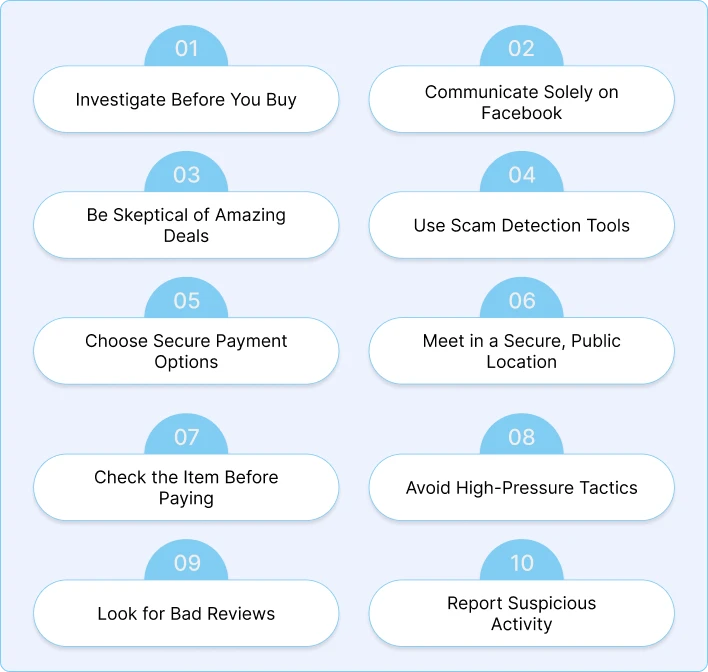
You may be wondering how to get rid of Facebook Marketplace scams. Don’t you? You can prevent scams on Facebook Marketplace if you follow these precautions.
- Investigate Before You Buy: Before you hit that “buy” button. You need to take a few minutes to research both the item and the seller. You can check out the seller’s profile for any red flags, like minimal activity or incomplete details. Then, compare prices of similar items. It will help you to make sure that the deal is reasonable. It can also help you verify the seller’s credibility.
- Communicate Solely on Facebook: You should keep all your conversations within Facebook Messenger. This way, there’s a record of everything, which can be super helpful if something goes wrong. So, always try to avoid giving out personal contact information or moving the chat to other platforms. It just adds unnecessary risk.
- Be Skeptical of Amazing Deals: If a deal looks unbelievably good. It’s probably not legit. Because scammers often lure people with prices that are way too low. So, you always have to Trust your gut. If something feels off, it’s better to skip it. Remember, if it sounds too good to be true, it likely is.
- Use Scam Detection Tools: You can think about using a scam detection app or browser extension to help spot potential fraud. These tools can scan listings and flag anything suspicious. Surely these will give you an extra layer of protection. They’re not perfect, but they can help.
- Choose Secure Payment Options: When it comes to making a payment, always go with secure payment methods like PayPal or Facebook’s own payment system. These offer some level of buyer protection. Also, you need to steer clear of wire transfers, gift cards, or cryptocurrency. These are hard to trace and recover if things go south.
- Meet in a Secure, Public Location: Whenever possible, arrange to meet the seller in a safe, public place. And, yes you need to avoid secluded spots and opt for well-populated areas. Many communities even have designated safe trading spots, often at police stations. And, don’t forget to bring a friend along can also add to your safety.
- Check the Item Before Paying: Don’t hand over the money until you’ve seen and inspected the item. It can leave you vulnerable to getting something that doesn’t match the description—or worse, nothing at all. Make sure you’re happy with the item’s condition and authenticity before completing the transaction.
- Avoid High-Pressure Tactics: You should watch out for sellers who push you to make a quick decision. You should keep one thing in mind high-pressure tactics are usually a sign something isn’t right. So, take your time to make sure everything checks out, and don’t let anyone rush you into a deal.
- Look for Bad Reviews: You can check out the seller’s reviews and ratings. If they have a lot of negative feedback or no reviews at all, that’s a red flag. You know that positive reviews from verified buyers are a good sign. However, if you see a lot of complaints, it’s best to move on.
- Report Suspicious Activity: If you come across a scam or anything that seems fishy. You should report it to Facebook right away. This helps protect others and can get the scammer removed from the platform. Facebook has tools for reporting scams and fraudulent listings. So, don’t hesitate to use them.
What Does Facebook Do to Prevent Scams?
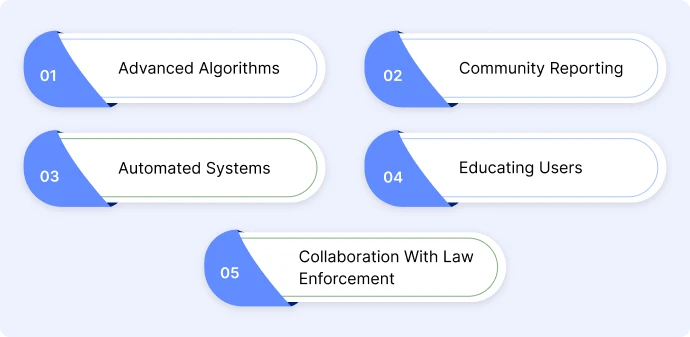
If you’re wondering what Facebook does to keep us safe from scams, let’s find out what they’re doing behind the scenes to protect us.
- Advanced Algorithms: Facebook has some seriously smart algorithms working in the background. These algorithms are constantly scanning posts, messages, and user behavior to spot any signs of potential scams. They can flag suspicious activity and help prevent scams from spreading like wildfire.
- Community Reporting: Ever reported a suspicious post or message? That’s one way Facebook stays on top of scams. They rely on us, the users, to report anything fishy we come across. When we report something, Facebook’s team takes a closer look and takes action if needed. It’s like having millions of extra sets of eyes looking out for each other.
- Automated Systems: This platform has automated systems to detect and remove scam-related content. These systems can quickly identify patterns and behaviors associated with scams. It helps to shut them down before they cause any harm. It’s like having a virtual security guard keeping watch 24/7.
- Educating Users: This social platform knows that educating users about common scams and how to spot them is key to staying safe online. They provide resources, tips, and even pop-up warnings to help users recognize and avoid falling for scams. It’s like having a personal online safety coach right in your pocket.
- Collaboration With Law Enforcement: Sometimes, scams can get pretty serious, and that’s when Facebook teams up with law enforcement agencies. They share information, coordinate efforts, and work together to track down and take legal action against scammers. It’s like having a whole army fighting on our side to keep the internet a safer place.
How to Report a Scammer on Facebook Marketplace?

If you are a victim of a scam on Facebook Marketplace, here’s a step-by-step guide on how to report the buyer or seller and the listing to Facebook.
How to Report a Seller Scam:
- Log in to Your Facebook Account
- Click on the Marketplace symbol located on the Menu bar.
- Find the listing of the seller you wish to report and click on it to open the listing.
- Click on the seller’s profile to view more details.
- At the top of their profile, click on the three dots (…) to open a dropdown menu.
- From the dropdown menu, select “Report” to initiate the reporting process.
- Facebook will guide you through the reporting process. Follow the instructions on your screen to complete the report.
How to Report a Buyer Scam:
- Log in to Your Facebook Account
- Click on the Marketplace symbol and then on the profile icon in the top right-hand corner.
- Select “Your Listings” to view all your listed items.
- Find the listing where the buyer messaged you and click on it.
- Click on the buyer’s name from your messages to view their profile.
- Similar to reporting a seller, click on the three dots (…) at the top of their profile and select “Report.”
- Follow the on-screen instructions provided by Facebook to complete the report.
How to Report a Listing Scam:
- Start by logging in to your Facebook account.
- Click on the Marketplace symbol to access the marketplace.
- Find the listing you want to report and click on it to open the listing details.
- Click on the three dots (…) in the upper right-hand corner of the listing.
- From the dropdown menu, select “Report Listing” to begin the reporting process.
- Facebook will provide instructions on how to proceed. Follow them carefully to complete the report.
Once you follow these steps, you can report scams on Facebook Marketplace and help protect yourself and others from falling victim to fraudulent activity. So, don’t hesitate to report any suspicious behavior you encounter.
What Happens When File a Report?
When you report for Facebook Marketplace scam, authorities safeguard your personal data and financial accounts. Here’s what you should do next:
- Review Your Credit Reports: You can take a moment to review your credit reports. You can do this for free at least once a year. You need to look closely for any unfamiliar activity or accounts that could signal identity theft. Catching these issues early is key to minimizing potential damage.
- Double-Check Your Bank Statements: Now, it’s time to comb through your bank statements with a fine-tooth comb. If you spot anything fishy, don’t hesitate to reach out to your bank immediately to report it.
- Sign Up for Identity Theft Protection: Even if you haven’t noticed any unusual activity yet, it’s still a good idea to sign up for identity theft protection. This service helps you monitor your identity, credit reports, and bank accounts over the long term. That way, you can quickly detect any signs of trouble and take swift action to address them before they spiral out of control.
Conclusion
More and more people are turning to Facebook Marketplace for their online shopping to get products at discounted prices and falling victim to Facebook Marketplace Scams. Not satisfied with this, they also look for other ways to profit from the wide world which Facebook has diversified through its different functionalities.
Therefore, it is necessary to adopt good security practices, pay attention to signs that an offer may be a scam, and inform yourself about the methodologies that cybercriminals use to carry out their attacks. This way, you will avoid buying yourself a problem.
Furthermore, always double-check the necessary information to eliminate all reasonable doubt and, if needed, report suspicious activities to ensure the safety of other users. Be proactive and alert – this might be the secret formula to prevent Facebook Marketplace scams.
Frequently Asked Questions
Facebook Marketplace can be a safe platform for doing business if users take precautions, such as verifying seller profiles, meeting in public places for transactions, and avoiding deals that seem too good to be true. Yes, scammers exist, you should use secure payment methods and be cautious when sharing personal information.
Recovering your money after a scam on Facebook Marketplace depends on the payment method you have used. If you paid through Facebook Checkout, you may be eligible for buyer protection and can file a dispute. However, transactions made via cash, or payment apps without buyer protection are harder to recover.
Yes, you can report the scam to Facebook even after the transaction. If you have used a protected payment method, you can also file a dispute with your payment service provider.
It’s generally not safe to share your home address on Facebook Marketplace. Instead, arrange to meet in public places for any business. If you must provide an address for larger items, consider using a neutral location like a storage facility or only share it once you have verified the buyer’s credibility.
Scammers often rush transactions. Take your time, ask questions, verify the seller, and avoid deals that seem too urgent or suspicious.




